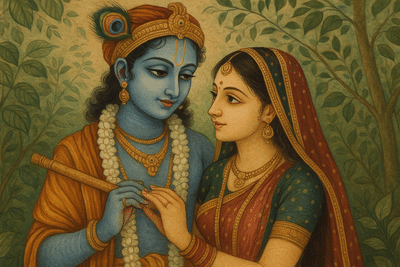 The love story of Krishna and Radha is celebrated as the highest form of devotion in Hindu mythology. Yet, Krishna’s departure from Vrindavan left many wondering why he left his beloved behind. The truth lies in his divine mission, to defeat evil, establish dharma, and guide humanity. Their separation was not heartbreak but a spiritual act that highlighted selfless love and eternal soul connection.
The love story of Krishna and Radha is celebrated as the highest form of devotion in Hindu mythology. Yet, Krishna’s departure from Vrindavan left many wondering why he left his beloved behind. The truth lies in his divine mission, to defeat evil, establish dharma, and guide humanity. Their separation was not heartbreak but a spiritual act that highlighted selfless love and eternal soul connection.

Why Krishna Left Radha: A Divine Separation for Eternal Love
Krishna’s primary purpose as an avatar was to restore dharma and protect the world from adharma. To defeat King Kamsa and establish righteousness, he had to leave Vrindavan, leaving behind his beloved Radha. This was a task greater than personal desire or comfort.
Why Krishna Left Radha: A Divine Separation for Eternal Love
Krishna’s departure reflected his commitment to dharma. Though he cherished Radha deeply, he understood that personal attachments could not hinder his divine responsibilities. By prioritizing his spiritual duty, Krishna demonstrated the essence of selfless action in service of the greater good.
Why Krishna Left Radha: A Divine Separation for Eternal Love
Their bond transcended physical presence. Radha and Krishna’s love was soul-based, eternal, and unbroken. Krishna’s leaving was not an end but a spiritual symbol, teaching that true devotion and love exist beyond proximity, time, or worldly constraints.
Mathura, Aug 16 (ANI): A priest performs the morning aarti of Lord Radha-Krishna at Shri Krishna Janmabhoomi temple on the occasion of Shri Krishna Janmashtami, in Mathura on Saturday. (ANI Photo)
Some interpretations suggest Krishna and Radha chose a spiritual union rather than conventional marriage. Their connection was meant to exemplify a higher, divine love, one that is pure, unconditional, and rooted in devotion rather than societal structures.